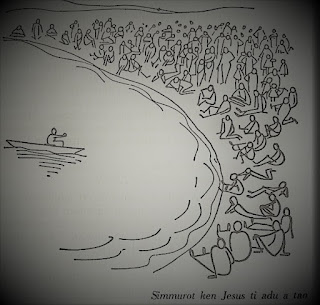Love your Enemies
“Keep your friends close, and your enemies closer,” counsels Michael Corleone to the longtime family friend and later turned traitor Frankie Pentangel (in the movie The Godfather: Part II).
That quote is attributed to Shun-Tzu, a Chinese general and military strategist in the 6th cent. B.C.E. and author of The Art of War. It means that you must keep an eye on your enemies all the time so that foreknowing their strategies and next moves, you can devise ahead your counter strike.
“Love your enemies,” now an often-heard line was unheard of before the time of Jesus. It was Jesus who first taught it and it’s one of a kind in its originality. It was unique and innovative (see Matthew 5:44).
Most similar commands in antiquity were about non-retaliation or benevolence to enemies. Take the for example the Book of Leviticus: “You shall not take vengeance or bear a grudge against any of your people, but you shall love your neighbor as yourself: I am the LORD” (Lev 19:18). Or the Book of Proverbs: “If your enemies are hungry, give them bread to eat; and if they are thirsty, give them water to drink; for you will heap coals of fire on their heads, and the LORD will reward you (Prov 25:21-22). Even the Hellenistic Greeks had taught on being humane (philanthropia) as reflected in the Book of Wisdom (11:17-12:22). But, not as direct, blunt, and disconcertingly brief command: “Love your enemies” (in Greek: AGAPATE TOUS ECHTHROUS).
That quote is attributed to Shun-Tzu, a Chinese general and military strategist in the 6th cent. B.C.E. and author of The Art of War. It means that you must keep an eye on your enemies all the time so that foreknowing their strategies and next moves, you can devise ahead your counter strike.
“Love your enemies,” now an often-heard line was unheard of before the time of Jesus. It was Jesus who first taught it and it’s one of a kind in its originality. It was unique and innovative (see Matthew 5:44).
Most similar commands in antiquity were about non-retaliation or benevolence to enemies. Take the for example the Book of Leviticus: “You shall not take vengeance or bear a grudge against any of your people, but you shall love your neighbor as yourself: I am the LORD” (Lev 19:18). Or the Book of Proverbs: “If your enemies are hungry, give them bread to eat; and if they are thirsty, give them water to drink; for you will heap coals of fire on their heads, and the LORD will reward you (Prov 25:21-22). Even the Hellenistic Greeks had taught on being humane (philanthropia) as reflected in the Book of Wisdom (11:17-12:22). But, not as direct, blunt, and disconcertingly brief command: “Love your enemies” (in Greek: AGAPATE TOUS ECHTHROUS).
The biblical scholar, Fr. John P. Meier (Marginal Jew, vol. 4) identifies only three of Jesus’ ethical teachings as unprecedented (nobody had taught these before Jesus did and that whose formulations can be traced back to him)—no to divorce, swear not all and love your enemies. The command to love the enemy is twice mentioned in Luke as well (6:27, 35).
Jesus must have been reacting against a limited interpretation of the love command in the sense of Jewish particularism or in the sense of popular (or Hellenistic) ethical common sense (commentary of Luz, p. 288).
Jesus has laid a foundation for the survival of humanity which at times chooses to turn its plowshares into swords and pruning hooks into spears (cf. Isaiah 2:4). If only nations were to heed this disconcertingly short and uncompromisingly forthright command, there will be peace on earth indeed.



Comments
Post a Comment